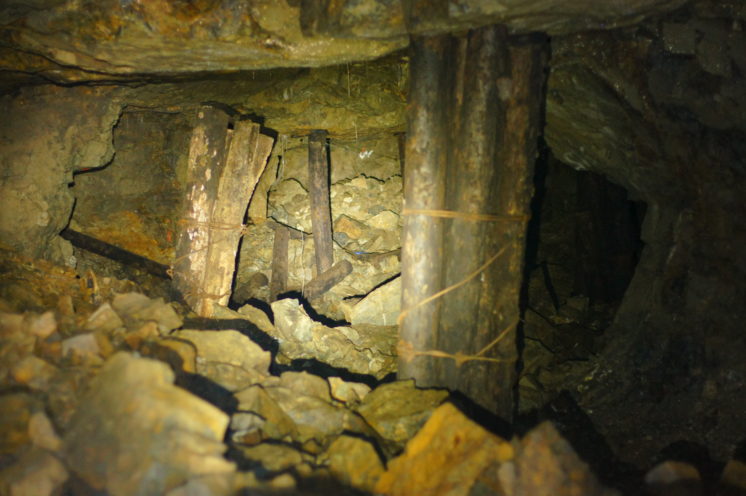Gabriel Resources sued Romania for not allowing it to start an environmentally damaging open-pit gold mine, showing how corporations use arbitration to contest states’ environmental protection measures.
 Photo: Tjflex/Flickr
Photo: Tjflex/FlickrThe Canadian mining company Gabriel Resources sought approvals from the Romanian government authorities for what would be the largest open-pit gold mine in Europe. It would require the annual use and release into the environment of tens of thousands of tonnes of cyanide, a highly toxic chemical, in order to extract gold from the rocks and minerals. Approvals were initially granted, and would have required the destruction of three villages and nearly 1,000 houses and churches, many national heritage sites.[1]
For several weeks in 2013, tens of thousands of people took to the streets across the country to oppose the mine and the so-called Roşia Montană Law, which would have fast-tracked approval of the project. The law was indeed rejected by the government.
Citizens then went to court to challenge the procedures and existing permits granted by the Romanian authorities for the mine. In each case, the courts found that the permits issued to the company had been obtained illegally – noting the lack of compliance with environmental laws or evidence of administrative abuses. Ultimately, the Romanian courts halted the mine. Until this day, the mining company has still not obtained all the necessary permits, because it failed to comply with domestic and EU law.[2]
Since 2015, Gabriel Resources has been suing Romania via investor-state dispute settlement (ISDS).[3] It argues that the country breached obligations in its bilateral investment treaties with Canada and the UK – because it ‘failed’ to grant the required permits. As evidence of its unfair treatment, the company points to the Romanian government’s application to turn Roşia Montană into a UNESCO World Heritage Site, and the fact that it sought parliamentary approval for the mine.[4]
According to a May 2019 press release, Gabriel Resources is claiming US$ 5.7 billion in compensation.[5] That figure is equivalent to 2.7 per cent of Romania’s gross domestic product (GDP). It is also eight times more than the money the company allegedly spent on developing the mine – on exploration, equipment etc. (US$ 650 million),[6] effectively making the ISDS suit the main source of profit and revenue. Gabriel Resources’ claim is financially backed by Wall Street hedge fund Tenor Capital Management. Tenor pays the company’s lawyers in exchange for getting a share of the money if it wins.[7]
There is reason to fear that Gabriel Resources’ multibillion lawsuit might force the Romanian government to allow the mine to be developed in order to settle the case, for example, by changing laws and issuing new permits. A first sign was the government’s decision to withdraw its application for Roşia Montană to become a UNESCO World Heritage Site in 2018.[8] Another indicator is a proposed new mining law from early 2019, which would enable new permits.[9]
In November 2018, the Roşia Montană community, together with environmental groups opposing the mine, wrote to the three private lawyers who will decide Gabriel Resources’ ISDS case. They explained how the company had violated its obligations under Romanian, EU and international environmental and human rights law and should therefore not be protected through special rights for foreign investors.[10]
As one of the groups’ lawyers put it: “Gabriel Resources has never had the right to mine in Roşia Montană. The company should not use investment arbitration to circumvent the legitimate enforcement of domestic law.”[11] The arbitrators accepted the letter, but refused to engage with attached testimonies of residents, effectively excluding the affected community from the proceedings.[12]
[1] Friends of the Earth Europe and others, Red Carpet Courts: 10 Stories of How the Rich and Powerful Hijacked Justice (Brussels: Friend of the Earth Europe, 2019), 76, http://10isdsstories.org/wp-content/uploads/2019/06/red-carpet-courts-WEB.pdf (accessed October 17, 2019).
[2] Alburnus Maior, Centrul Independent pentru Dezvoltarea Resurselor de Mediu, and Greenpeace Romania, “Amicus Curiae Submission,” November 2, 2018, https://www.ecchr.eu/fileadmin/Juristische_Dokumente/181102_Amicus_Submission_Rosia_Montana_ICSID_ARB_15_31_final.pdf (accessed October 17, 2019).
[3] Gabriel Resources Ltd. and Gabriel Resources (Jersey) v. Romania, International Centre for Settlement of Investment Disputes, ARB/15/31, https://icsid.worldbank.org/en/Pages/cases/casedetail.aspx?CaseNo=ARB/15/31 (accessed October 17, 2019).
[4] Ţuca Zbârcea & Asociaţii and White & Case LLP, “Gabriel Resources Ltd. and Gabriel Resources (Jersey) Ltd.: Claimants Memorial,” June 30, 2017, http://icsidfiles.worldbank.org/icsid/ICSIDBLOBS/OnlineAwards/C4706/DS11266_En.pdf (accessed October 17, 2019).
[5] Gabriel Resources Ltd., “2019 First Quarter Press Release,” May 14, 2019, http://www.gabrielresources.com/site/documents/GBU_Q1_2019_PR.pdf (accessed October 17, 2019).
[6] Ţuca Zbârcea & Asociaţii and White & Case LLP.
[7] Gabriel Resources Ltd., “Closing of Private Placement Press Release,” July 14, 2016, http://www.gabrielresources.com/documents/GBU_closingofprivateplacement_140716_close_filing.pdf (accessed October 17, 2019).
[8] Claudia Ciobanu “Masks fall as Romanian government withdraws UNESCO application for Roşia Montana,” Euractiv, opinion section, June 7, 2018, https://www.euractiv.com/section/central-europe/opinion/masks-fall-as-romanian-government-withdraws-unesco-application-for-rosia-montana/ (accessed October 17, 2019).
[9] Claudia Ciobanu and Mihai Stoica, “Roşia Montană: Seeds of utopia in town almost lost to gold mining,” Aljazeera, April 24, 2019, https://www.aljazeera.com/indepth/inpictures/rosia-montana-seeds-utopia-town-lost-gold-mining-190423063941002.html (accessed October 17, 2019).
[10] Alburnus Maior, Centrul Independent pentru Dezvoltarea Resurselor de Mediu, and Greenpeace Romania.
[11] Alburnus Maior and others “Roşia Montană voices to be heard in illegal Romanian gold mine litigation,” November 5, 2018, https://www.ciel.org/news/justice-for-rosia-montana/ (accessed October 17, 2019).
[12] Lisa Kadel and Christian Schliemann, “Gabriel Resources v. Romania: Local Residents as Third Parties in Investor-State Dispute Settlement?,” April 19, 2019, http://ohrh.law.ox.ac.uk/gabriel-resources-v-romania-local-residents-as-third-parties-in-investor-state-dispute-settlement/ (accessed October 17, 2019).
